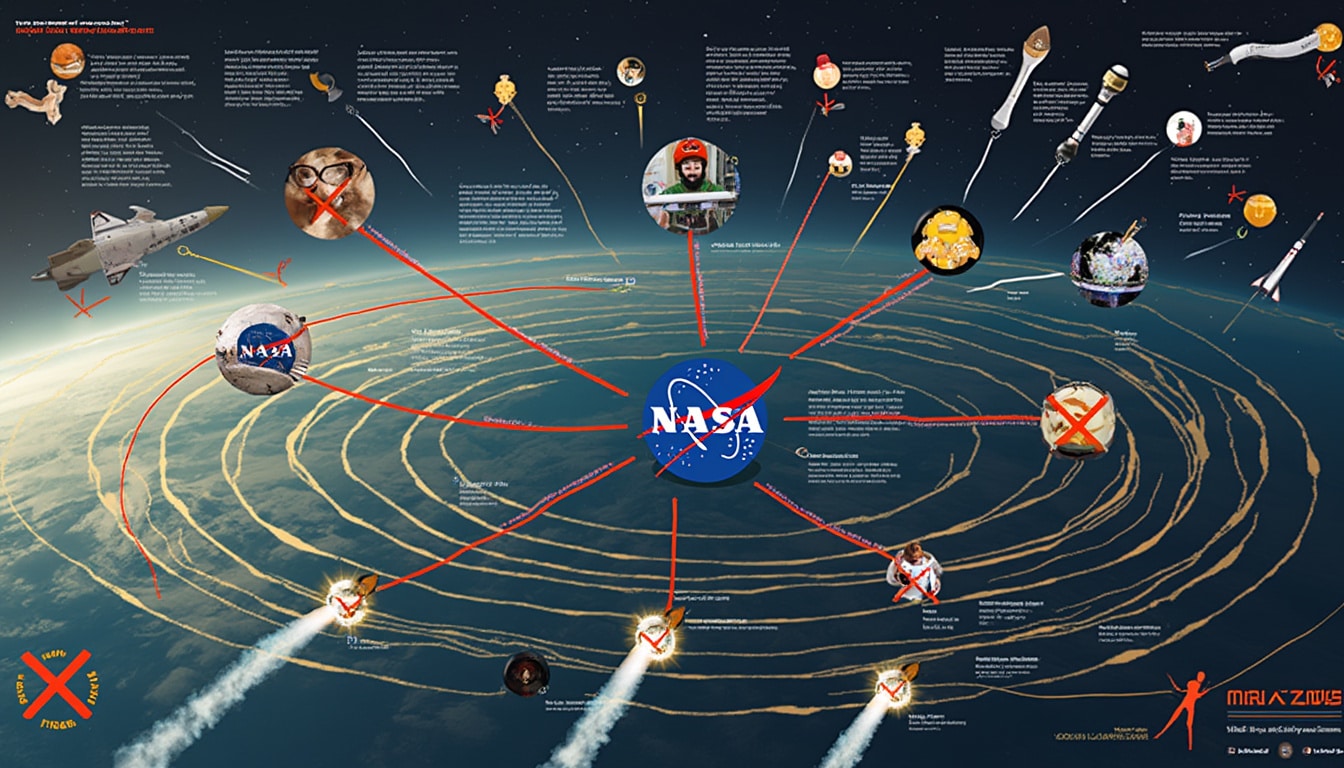Recent developments have emerged surrounding NASA’s relationship with the Department of Government Efficiency (DOGE), particularly the involvement of Elon Musk and the potential implications for space exploration funding. With rising concerns over conflicts of interest, various members of Congress are demanding transparency regarding DOGE’s activities within NASA. This article delves deep into these inquiries, the overarching questions regarding cryptocurrency regulations, and the broader impact these developments may have on NASA’s mission and responsibilities. The negotiations hold significant weight as they could influence future funding for space programs and investigatory oversight.
The crux of the matter lies in the congressional oversight over DOGE’s activities. There is a widespread sentiment that ensuring transparency is essential to maintain public trust. Members from both parties are echoing similar calls for clarity while scrutinizing NASA’s protocols in handling sensitive data and their broader engagement with the burgeoning cryptocurrency sector.
Understanding DOGE’s Activities Within NASA
The recent correspondence from key Democratic members of the House Science Committee raises critical questions about the role of DOGE in NASA. The absence of clear information surrounding DOGE’s mandate and the identity of the individual employed by this initiative at NASA has led to significant unease. The committee leaders – including Representatives Zoe Lofgren and Valerie Foushee – have expressed discomfort over the opaque nature of the engagement, describing it as “ominous and unacceptable.” The congressional inquiry emphasizes that understanding DOGE’s precise functions, especially regarding classified and proprietary data, is essential for ensuring the integrity of NASA’s operations aligned with NASA engagement initiatives.

Key Concerns Regarding Transparency
The debate centers around the transparency of DOGE’s operations and its implications for agency protocols. Questions have been posited regarding whether the roles allotted to DOGE personnel will influence policy and decision-making within NASA. It’s vital to ascertain if these individuals are simply tasked with observing operations, or if they hold substantial decision-making authority. The representatives have urged NASA to disclose the background of the DOGE representative working within their ranks, noting that a lack of information could undermine oversight and accountability.
The capacity for DOGE to assign personnel without NASA’s consent raises alarm bells within Congress. It necessitates clear definitions and frameworks regarding how these roles interact with existing NASA leadership structures and operational directives. These concerns tap into the ongoing dialogue surrounding blockchain in space and how such innovations intersect with traditional roles in space program management.
Potential Implications for Space Exploration Funding
Funding for space exploration initiatives hinges upon the stability and integrity of agencies like NASA. If DOGE’s operations unsettle existing frameworks, it could lead to fragmentation in funding channels, diverting valuable resources away from critical missions. Members of Congress are alert to these nuances, emphasizing that pursuing space exploration funding should be grounded in stable, accountable administrations devoid of systemic conflicts.
During recent discussions, concerns were raised about how cryptocurrencies, particularly Dogecoin, might influence governmental agency decisions. The integration of popular cryptocurrencies into operational funding models poses inherent risks, leading members to ponder the overarching consequences of such financial maneuvers.
Managing Conflicts of Interest in Space Agency Operations
The internal dynamics of NASA, particularly regarding its engagement with DOGE, warrant extensive scrutiny. The intertwined relationship between Elon Musk’s leadership of DOGE and SpaceX complicates traditional boundaries, potentially leading to conflicts of interest. It’s important for NASA to establish concrete boundaries mitigating risks posed by such overlaps, especially concerning sensitive information and operational integrity.

Establishing Boundaries for NASA’s Operations
Congressional leaders have signaled their willingness to monitor and act on these issues. The insistent push for defining the authority that DOGE personnel may wield reflects significant concerns. Will they operate under NASA’s umbrella, or act independently with directives from Musk? This lack of clarity can foster an environment where lapses in security and protocol adherence occur, potentially risking national interests tied to space initiatives.
Members have urged NASA to disclose how it plans to mitigate conflicts surrounding personnel choices, ensuring that its best interests—and those of the public—are safeguarded. The complexity of interactions surrounding Musks’ varied roles necessitates a thorough understanding and careful navigation to prevent potential fallouts that could echo throughout space exploration initiatives.
Broader Implications on Cryptocurrency Regulations
Engagements like these give rise to conversations about existing cryptocurrency regulations, particularly as they relate to government operations. The emergence of DOGE as a potential player in NASA’s framework opens avenues for dialogue on establishing formal guidelines for cryptocurrencies’ roles in federal agency funding and operations. Members of Congress are keen to tackle these discussions, highlighting the need for a holistic approach to regulation aligning with contemporary trends in finance and technological innovation.
Moreover, the assertion of DOGE’s interests in exploring connections with NASA raises questions regarding the ethics of such engagements, urging legislators to proactively uphold integrity in governmental operations. Proactive legislative measures are pivotal to regulating how cryptocurrencies could redefine operational boundaries.
Navigating NASA’s Future in Space Exploration
Looking ahead, the path is filled with both challenges and opportunities. The intersection of traditional space operations with the burgeoning cryptocurrency landscape requires astute navigation by stakeholders. As NASA grapples with potential changes, it remains paramount to preserve the integrity of exploratory missions that inspire public confidence.
Innovation and Accountability in Space Missions
Innovation is vital for NASA to remain competitive in a rapidly evolving landscape of space discovery. However, it must be balanced with stringent accountability measures. Creating transparent channels for communication and maintaining oversight are crucial to maturing the dialogue around NASA and cryptocurrency. Engagements between crypto-based entities like DOGE and government agencies should focus on enhancing space exploration without compromising the foundational principles of research integrity and public trust.
Public support for space exploration depends heavily on confidence in agency resiliency, especially during instances like the current cross-examination of DOGE’s presence. Establishing a clear, comprehensive understanding of these dynamics can pave the way for novel financing routes and innovative opportunities while ensuring historical commitments to integrity remain intact.
Building a Framework for Future Missions
Emphasizing a risk-managed framework for future missions may provide pathways for mutually beneficial engagements between space agencies and cryptocurrency innovators. Members of Congress stress the importance of not only acknowledging evolving technologies but also rigorously evaluating their implications on mission integrity and success.
Ultimately, fostering an environment conducive to collaboration and ensuring transparency—as insisted upon by congressional leaders—will be crucial as NASA engages with emerging technologies like blockchain and various cryptocurrencies. By focusing on cohesive strategies that prioritize public service and scientific advancement, the journey towards space exploration can forge ahead unimpeded.
Conclusion and Future Directions
In closing, the unfolding scenario between NASA and DOGE raises larger questions about the future of space exploration, funding, and regulatory practices in a rapidly changing landscape. The need for clarity, accountability, and integrity is more pressing than ever, particularly within sensitive governmental interactions. These will direct the trajectory of space missions while safeguarding public interests. Members of Congress commit to closely monitoring how these dynamics evolve, ensuring that transparency and ethical considerations remain paramount as they guide NASA into its next frontier.




Leave a Reply